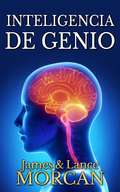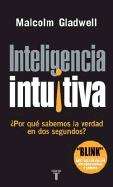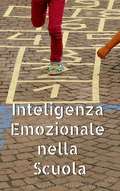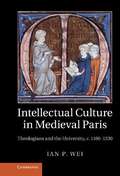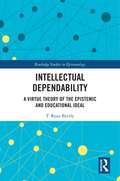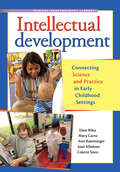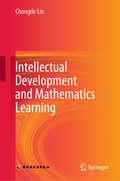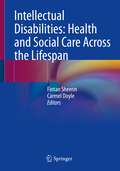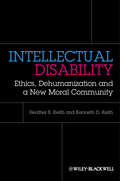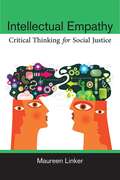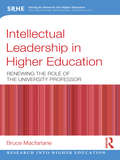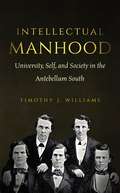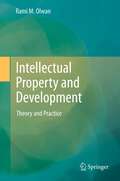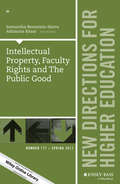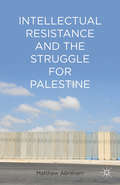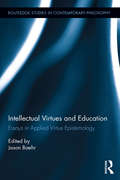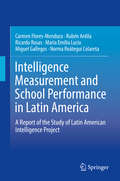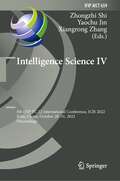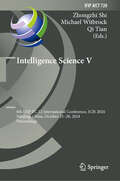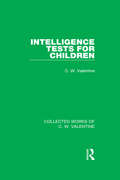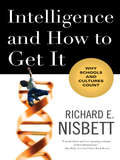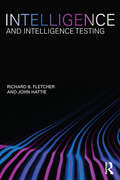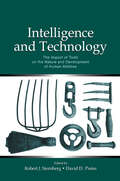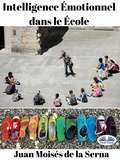- Table View
- List View
Inteligencia de Genio
by James Morcan Lance Morcan Marcela Gutiérrez Bravo y L. Arturo Sánchez GtzInteligencia de Genio es el último tratado sobre métodos de aprendizaje acelerado. Escrito por los novelistas, cineastas e investigadores independientes James Morcan y Lance Morcan, con un prefacio del Dr. Takaaki Musha, este libro acaba con el mito de que los genios nacen y no se hacen. Revela cómo la mayoría de las características de las inteligencias superiores a lo ordinario son adquiridas por medio de técnicas o tecnologías de desarrollo mental. Exponiendo los últimos descubrimientos en la neurociencia, Inteligencia de Genio, enlista docenas de métodos prácticos para incrementar el IQ y aprender con velocidad cualquier materia.
Inteligencia intuitiva
by Malcolm GladwellEn este libro revolucionario, el periodista estadounidense Malcolm Gladwell nos explica cómo pensamos sin pensar, de dónde proceden las decisiones que parece que tomamos en dos segundos, pero que no son tan simples como aparentan. ¿Por qué algunas personas son brillantes a la hora de decidir y otras son torpes una y otra vez? ¿Por qué algunos siguen su instinto y triunfan, mientras que otros acaban siempre dando un paso en falso? ¿Cuál es el funcionamiento real del cerebro en el trabajo, en clase, en la cocina o en la cama? ¿Y por qué las mejores decisiones suelen ser las más difíciles de explicar? Gladwell nos presenta a un psicólogo que ha aprendido a predecir si un matrimonio puede durar con sólo observar a sus miembros unos minutos; a un entrenador de tenis que sabe cuándo un jugador cometerá doble falta antes incluso de que la raqueta toque la bola; a un experto en antigüedades que reconoce una falsificación de un solo vistazo. Este libro revela que quienes son buenos tomando decisiones no son aquellos que procesan más información o que dedican más tiempo a deliberar, sino aquellos que han perfeccionado el arte de hilar fino, de extraer los pocos factores que realmente importan a partir de una cantidad desmesurada de variables. Por medio de la neurología y la psicología, y exhibiendo todo el esplendor del que este autor es capaz, Inteligencia intuitiva cambia nuestra forma de tomar decisiones y revoluciona nuestra manera de pensar.
Inteligenza Emozionale nella Scuola
by Juan Moisés de la SernaSiamo di fronte ad un eccellente libro il cui materiale è chiaro e completamente didattico, indicando non solo gli specialisti nel campo della psicologia, ma anche educatori e psicologi dell'educazione, personale cruciale per il corretto sviluppo dei comportamenti nei giovani, negli adolescenti in particolare nel campo scolastico, e anche nella loro naturale evoluzione.
Intellectual Culture in Medieval Paris
by Ian P. WeiIn the thirteenth century, the University of Paris emerged as a complex community with a distinctive role in society. This book explores the relationship between contexts of learning and the ways of knowing developed within them, focusing on twelfth-century schools and monasteries, as well as the university. By investigating their views on money, marriage and sex, Ian Wei reveals the complexity of what theologians had to say about the world around them. He analyses the theologians' sense of responsibility to the rest of society and the means by which they tried to communicate and assert their authority. In the late thirteenth and early fourteenth centuries, however, their claims to authority were challenged by learned and intellectually sophisticated women and men who were active outside as well as inside the university and who used the vernacular – an important phenomenon in the development of the intellectual culture of medieval Europe.
Intellectual Dependability: A Virtue Theory of the Epistemic and Educational Ideal (Routledge Studies in Epistemology)
by T. Ryan ByerlyIntellectual Dependability is the first research monograph devoted to addressing the question of what it is to be an intellectually dependable person—the sort of person on whom one’s fellow inquirers can depend in their pursuit of epistemic goods. While neglected in recent scholarship, this question is an important one for both epistemology—how we should conceptualize the ideal inquirer—and education—how we can enable developing learners to grow toward this ideal. The book defends a virtue theory according to which being an intellectually dependable person is distinctively a matter of possessing a suite of neglected virtues called "the virtues of intellectual dependability" that are themselves distinctively concerned with promoting epistemic goods in others’ inquiries. After defending the existence and educational significance of these virtues as a group, the book turns toward the project of identifying and conceptualizing several specific instances of these virtues in detail. Virtues discussed include intellectual benevolence, intellectual transparency, communicative clarity, audience sensitivity, and epistemic guidance. In each case, an interdisciplinary treatment of the nature of the virtue and its relationship to other virtues, vices, and personality features is offered, drawing especially on relevant research in Philosophy and Psychology. The book concludes with a chapter devoted to identifying distinctive ways these virtues of intellectual dependability are manifested when it is inquiring communities, rather than individuals, that occupy the position of intellectual dependence. By directing attention to the ideal of intellectual dependability, the book marks a novel turn of scholarly interest explicitly toward a neglected dimension of the ideal inquirer that will inform both epistemological theorizing and educational practice.
Intellectual Development
by Dave RileyTo the untrained eye, many of the common activities in early childhood settings may not seem educational. In reality, research shows that these activities are actually learning tools that promote children's intellectual development.Why do we sort blocks and sing nursery rhymes with children, and what do they learn from these activities? Intellectual Development answers these questions and investigates the link between the best practices in early childhood education and the science of child development. This book will help teachers answer the question "Why do we do what we do?"Chapters cover language and literacy development, early number learning, and musical and artistic development. The book also contains information on early learning standards, practice tips, and recommended readings.
Intellectual Development and Mathematics Learning
by Chongde LinThis book introduces the outcomes of author’s 40 years of research, especially the theory of “the Triangular Pyramid Structure of Thinking” that he independently proposed, and the application of his development theory in the field of mathematics education. The book firstly explains the substantial character of intelligence, the development law of intelligence, and the relationship between intelligence development and creativity cultivation. Secondly, it discusses the structure of mathematical thinking of children and adolescents from 0 to 18 years old, and the methods of developing students’ thinking ability and the quality of intelligence through arithmetic learning. In the end, this book also demonstrates the characteristics of the development of mathematical thinking ability of children at age 0-6, elementary school students, and secondary school students, and the related latest research in this field. Based on the theory of “the Triangular Pyramid Structure of Thinking”, a number of examples are given to illustrate how the theory of intelligence development can be used in mathematics teaching to promote the development of students’ thinking abilities and to improve the quality of teaching.This book covers various areas including psychology, mathematics, and education. It has a great reference value for scholars in the field of psychology to study the theory of intelligence and the structure of thinking, providing guidance for parents and mathematics teachers to promote children’s quality of intelligence and mathematical thinking abilities, and to enhance their mathematics learning effects. In addition, it provides examples for psychological research to serve specific subject teaching in elementary and secondary schools.
Intellectual Disabilities: Health and Social Care Across the Lifespan
by Fintan Sheerin Carmel DoyleThis textbook provides nurses, allied health and social care professionals with the background knowledge necessary to support individuals with intellectual disabilities and their families. It is a unique and viable resource which is particularly timely, as recent decades have seen a significant change in the demographics and associated care and support needs of this population. The textbook is laid into four sections to provide a logical structure for the content with chapters developing key topic areas relevant to the field. The introductory section sets the overall context for the book and considers the importance of developing an understanding of intellectual disability as a core concept identifying philosophies and models of service that underpin health and social care across the lifespan. Communication as a basis for caring and the overall concept of person-centred caring in a multidisciplinary context is considered. The second section explores key concepts from birth to adulthood exploring the nature of intellectual disability, the child with intellectual disability and other related neurodevelopmental conditions. The third section explores adulthood to older age and considers specific health care needs, understanding behaviour and other fundamental concepts including mental health, ageing and palliative care. The fourth and final section explores the integration of health and social care addressing such issues as supporting and enabling families, education, employment, and sexuality and relationships. Edited by experienced and widely respected professionals, this textbook is written by international practitioners, educators and researchers who all play critical roles in working with individuals with intellectual disability and their families.
Intellectual Disability
by Heather Keith Kenneth D. KeithIntellectual Disability: Ethics, Dehumanization, and a New Moral Community presents an interdisciplinary exploration of the roots and evolution of the dehumanization of people with intellectual disabilities.Examines the roots of disability ethics from a psychological, philosophical, and educational perspectivePresents a coherent, sustained moral perspective in examining the historical dehumanization of people with diminished cognitive abilitiesIncludes a series of narratives and case descriptions to illustrate argumentsReveals the importance of an interdisciplinary understanding of the social construction of intellectual disability
Intellectual Empathy: Critical Thinking For Social Justice
by Maureen LinkerIntellectual Empathy provides a step-by-step method for facilitating discussions of socially divisive issues. Maureen Linker, a philosophy professor at the University of Michigan–Dearborn, developed Intellectual Empathy after more than a decade of teaching critical thinking in metropolitan Detroit, one of the most racially and economically divided urban areas, at the crossroads of one of the Midwest’s largest Muslim communities. The skills acquired through Intellectual Empathy have proven to be significant for students who pursue careers in education, social work, law, business, and medicine. Now, Linker shows educators, activists, business managers, community leaders—anyone working toward fruitful dialogues about social differences—how potentially transformative conversations break down and how they can be repaired. Starting from Socrates’s injunction know thyself, Linker explains why interrogating our own beliefs is essential. In contrast to traditional approaches in logic that devalue emotion, Linker acknowledges the affective aspects of reasoning and how emotion is embedded in our understanding of self and other. Using examples from classroom dialogues, online comment forums, news media, and diversity training workshops, readers learn to recognize logical fallacies and critically, yet empathically, assess their own social biases, as well as the structural inequalities that perpetuate social injustice and divide us from each other.
Intellectual Leadership in Higher Education: Renewing the role of the university professor (Research into Higher Education)
by Bruce MacfarlaneWhat is ‘intellectual leadership’ and how might this concept be better understood in the modern university? Drawing on research into the role of full or chair professors, this book argues that it is important to define and reclaim intellectual leadership as a counter-weight to the prevailing managerial culture of higher education. It contends that professors have been converted into narrowly defined knowledge entrepreneurs and often feel excluded or marginalised as leaders by their own universities. To fulfil their role professors need to balance the privileges of academic freedom with the responsibilities of academic duty. They exercise their academic freedom as critics and advocates but they also need to be mentors, guardians, enablers and ambassadors. Four orientations to intellectual leadership are identified: knowledge producer, academic citizen, boundary transgressor and public intellectual. These orientations are illustrated by reference to the careers of professors and show how intellectual leadership can be better understood as a transformational activity. This book tackles the question of what intellectual leadership actually is and analyses the questions most frequently associated with the role of senior academics, including: How can intellectual leadership be distinguished from other forms of leadership and management? How can professors balance their responsibilities both within and beyond the university? How can universities make better use of the expertise of professors as leaders? It concludes with recommendations for senior institutional managers on how to make more effective use of the expertise and leadership potential of the senior professoriate.
Intellectual Manhood
by Timothy J. WilliamsIn this in-depth and detailed history, Timothy J. Williams reveals that antebellum southern higher education did more than train future secessionists and proslavery ideologues. It also fostered a growing world of intellectualism flexible enough to marry the era's middle-class value system to the honor-bound worldview of the southern gentry. By focusing on the students' perspective and drawing from a rich trove of their letters, diaries, essays, speeches, and memoirs, Williams narrates the under examined story of education and manhood at the University of North Carolina, the nation's first public university.Every aspect of student life is considered, from the formal classroom and the vibrant curriculum of private literary societies to students' personal relationships with each other, their families, young women, and college slaves. In each of these areas, Williams sheds new light on the cultural and intellectual history of young southern men, and in the process dispels commonly held misunderstandings of southern history. Williams's fresh perspective reveals that students of this era produced a distinctly southern form of intellectual masculinity and maturity that laid the foundation for the formulation of the post-Civil War South.
Intellectual Property and Development
by Rami M. OlwanThe book examines the correlation between Intellectual Property Law - notably copyright - on the one hand and social and economic development on the other. The main focus of the initial overview is on historical, legal, economic and cultural aspects. Building on that, the work subsequently investigates how intellectual property systems have to be designed in order to foster social and economic growth in developing countries and puts forward theoretical and practical solutions that should be considered and implemented by policy makers, legal experts and the Word Intellectual Property Organization (WIPO).
Intellectual Property, Faculty Rights and the Public Good: New Directions for Higher Education, Number 177 (J-B HE Single Issue Higher Education)
by Adrianna Kezar Bernstein-SierraExplore the different forms that intellectual property (IP) has taken in higher education in recent years and how to navigate the changing landscape for faculty members and university administrators. Due to technological advancements and the rise of neo-liberal policies influenced by academic capitalism, faculty members are finding their rights being renegotiated, often without their input. Through patents, copyrights, distance education programs and MOOCS, universities and publishers are seeking to gain a competitive advantage in a market largely dominated by profit generation. All this is putting the university’s public mission in tension with increasingly profit-driven university management practices.This volume: Presents policy trends in university IP regulation over the past 40 years, Examines the utility of IP rights in higher education, Considers the implications of knowledge ownership in the academic profession. and Details the IP barriers that faculty encounter when attempting to share their work. This is the 177th volume of the Jossey-Bass quarterly report series New Directions for Higher Education. Addressed to presidents, vice presidents, deans, and other higher education decision makers on all kinds of campuses, it provides timely information and authoritative advice about major issues and administrative problems confronting every institution.
Intellectual Property, Indigenous People and their Knowledge
by Peter DrahosAfter colonization, indigenous people faced an extractive property rights regime for both their land and knowledge. This book outlines that regime, and how the symbolic function of international intellectual property continues today to assist states to enclose indigenous peoples' knowledge. Drawing on more than 200 interviews, Peter Drahos examines the response of indigenous people to the colonizer's non-developmental property rights. The case studies reveal how they have adapted to the state's extractive order through a process of regulatory bricolage. In order to create a new developmental future for themselves, indigenous developmental networks have been forged - high trust networks that include partnerships with science. Intellectual Property, Indigenous People and their Knowledge argues for a developmental intellectual property order for indigenous people based on a combination of simple rules, principles and a process of regulatory convening.
Intellectual Resistance and the Struggle for Palestine
by M. AbrahamBy positioning the late Edward Said's political interventions as a public intellectual on behalf of Palestinian populations living under Israeli occupation as a form of intellectual resistance, Abraham moves to consider forms of physical resistance, seeking to better understand the motivations of those who choose to turn their bodies into weapons.
Intellectual Virtues and Education: Essays in Applied Virtue Epistemology (Routledge Studies in Contemporary Philosophy)
by Jason BaehrWith its focus on intellectual virtues and their role in the acquisition and transmission of knowledge and related epistemic goods, virtue epistemology provides a rich set of tools for educational theory and practice. In particular, characteristics under the rubric of "responsibilist" virtue epistemology, like curiosity, open-mindedness, attentiveness, intellectual courage, and intellectual tenacity, can help educators and students define and attain certain worthy but nebulous educational goals like a love of learning, lifelong learning, and critical thinking. This volume is devoted to exploring the intersection between virtue epistemology and education. It assembles leading virtue epistemologists and philosophers of education to address such questions as: Which virtues are most essential to education? How exactly should these virtues be understood? How is the goal of intellectual character growth related to other educational goals, for example, to critical thinking and knowledge-acquisition? What are the "best practices" for achieving this goal? Can growth in intellectual virtues be measured? The chapters are a prime example of "applied epistemology" and promise to be a seminal contribution to an area of research that is rapidly gaining attention within epistemology and beyond.
Intelligence Measurement and School Performance in Latin America: A Report of the Study of Latin American Intelligence Project
by Carmen Flores-Mendoza Rubén Ardila Ricardo Rosas María Emilia Lucio Miguel Gallegos Norma Reátegui ColaretaThis book presents the results of the most complete and updated assessment of cognitive resources of students in Latin America: the Study of Latin American Intelligence (SLATINT). During four years, top researchers of the region used a standardized set of cognitive measures to assess 4,000 students aged between 14 and 15 years from six countries: Brazil, Argentina, Mexico, Chile, Colombia and Peru. The data collected and now analyzed in this volume is a first step to understand the human cognitive capital of the region, a crucial resource for any country today. Intelligence research has shown that the cognitive skills of a population are strongly associated with the school performance of its students and the development of a nation. This makes Intelligence Measurement and School Performance in Latin America a valuable tool both for Latin American researchers and authorities engaged in the improvement of each country’s human resources and for psychologists, educators and other social scientists dedicated to the study of the impact of intelligence in the development of nations.
Intelligence Science IV: 5th IFIP TC 12 International Conference, ICIS 2022, Xi'an, China, October 28–31, 2022, Proceedings (IFIP Advances in Information and Communication Technology #659)
by Zhongzhi Shi Yaochu Jin Xiangrong ZhangThis book constitutes the refereed proceedings of the 5th International Conference on Intelligence Science, ICIS 2022, held in Xi'an, China, in August 2022. The 41 full and 5 short papers presented in this book were carefully reviewed and selected from 85 submissions. They were organized in topical sections as follows: Brain cognition; machine learning; data intelligence; language cognition; remote sensing images; perceptual intelligence; wireless sensor; and medical artificial intelligence.
Intelligence Science V: 6th IFIP TC 12 International Conference, ICIS 2024, Nanjing, China, October 25–28, 2024, Proceedings (IFIP Advances in Information and Communication Technology #720)
by Qi Tian Zhongzhi Shi Michael WitbrockThis book constitutes the refereed proceedings of the 6th IFIP TC 12 International Conference on Intelligence Science, ICIS 2024, held in Nanjing, China, in October 25-28, 2024. The 23 full papers and 2 short papers presented here were carefully reviewed and selected from 32 submissions. These papers have been categorized into the following sections: Machine Learning; Causal Reasoning; Large Language Model; Intelligent Robot; Perceptual Intelligence; AI for Science; Medical Artificial Intelligence.
Intelligence Tests for Children (Collected Works of C.W. Valentine)
by C.W. ValentineOriginally published in 1945, this title was intended mainly for use by teachers wishing to test children from ages 2-8 in order to establish their intelligence. Based on feedback to the author, this revised edition also includes tests for children up to the age of 15. The tests were used to give a teacher some idea of how much could be expected of each child, so that the class, when practicable, could be divided into groups of varying abilities, which could proceed at paces suited to their respective capacities. It was felt that if ‘inborn intellectual deficiencies’ could be identified at an early age the children could have ‘special treatment’, or in certain cases be placed in a ‘special school’, rather than be potentially written off as ‘lazy’. Today this can be read and enjoyed in its historical context.
Intelligence and How to Get It: Why Schools and Cultures Count
by Richard E. Nisbett"[Nisbett] weighs in forcefully and articulately . . . [using] a thoroughly appealing style to engage . . . throughout."--Publishers Weekly Who are smarter, Asians or Westerners? Are there genetic explanations for group differences in test scores? From the damning research of The Bell Curve to the more recent controversy surrounding geneticist James Watson's statements, one factor has been consistently left out of the equation: culture. In the tradition of Stephen Jay Gould's The Mismeasure of Man, world-class social psychologist Richard E. Nisbett takes on the idea of intelligence as biologically determined and impervious to culture with vast implications for the role of education as it relates to social and economic development. Intelligence and How to Get It asserts that intellect is not primarily genetic but is principally determined by societal influences.
Intelligence and Intelligence Testing
by John Hattie Richard B FletcherHave you ever wondered what IQ is and how it is measured? Why is there such a premium placed on high IQ? What do we mean by intelligence? What does your IQ score mean? There can be no denying the enduring appeal of IQ over the last century. It is probably one of the most misunderstood yet highly researched psychological constructs ever. Such has been the controversy surrounding this topic that it is difficult to distinguish fact from fiction. Intelligence and Intelligence Testing is a text that aims to address that. This book examines the controversial psychological construct that is IQ, discussing and reviewing the history and current status of the research on intelligence and providing an overview of its development, measurement and use. From Galton, Spearman and Binet to the relatively recent controversy caused by the research of Herrnstein and Murray, this important book makes a major claim about the importance today of ‘problem solving on demand’ as one of the key components of today’s notions of intelligence. Chapters include coverage of: Intelligence and schooling; Cultural differences in views of intelligence; The history of IQ testing and its emergence into public consciousness; IQ as predictor of educational and occupational outcomes; Psychometrics and measurement of intelligence; The future of intelligence research. Written by Richard B. Fletcher and John Hattie, the author of the highly-regarded Visible Learning, this textbook will be invaluable for all undergraduate and Masters level students studying the theory of intelligence and the impact of testing on educational. Detailed and annotated further reading lists and a glossary of terms are also included.
Intelligence and Technology: The Impact of Tools on the Nature and Development of Human Abilities (Educational Psychology Ser.)
by Robert J. Sternberg David D. PreissIn this volume, Robert J. Sternberg and David D. Preiss bring together different perspectives on understanding the impact of various technologies on human abilities, competencies, and expertise. The inclusive range of historical, comparative, sociocultural, cognitive, educational, industrial/organizational, and human factors approaches will stimula
Intelligence Émotionnel dans le École
by Juan Moisés de la SernaParler de l'Intelligence émotionnelle est de le faire maintenant, en termes de développement de la personne, un aspect qui a été en plein essor depuis des dizaines d'années et dont la portée a été utile non seulement dans le champ si vous n'avez pas également. De plus en plus, il y a plus d'études qui s'accumulent sur les avantages d'un bon développement de l'Intelligence Émotionnelle, recommandé pour être formé en elle-le plus tôt sera le mieux. Par conséquent, l'école est le droit de l'environnement pour les petits et même les adolescents à connaître et à développer l'Intelligence Émotionnelle.
